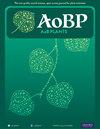Flowering phenology differs among wet and dry sub-alpine meadows in southwestern China
IF 2.4
3区 生物学
Q2 ECOLOGY
引用次数: 0
Abstract
The effect of floral traits, floral rewards and plant water availability on plant-pollinator interactions are well-documented; however, empirical evidence of their impact on flowering phenology in high-elevation meadows remains scarce. In this study, we assessed three levels of flowering phenology, i.e., population-, individual- and flower-level (floral longevity), in two nearby but contrasting (wet versus dry) sub-alpine meadows on Yulong Snow Mountain, southwestern China. We also measured a series of floral traits (pollen number, ovule number, and the ratio of pollen to ovule number per flower, i.e., pollen:ovule ratio [P/O]) and floral rewards (nectar availability and pollen presentation) as plausible additional sources of variation for each phenological level. Floral longevity in the wet meadow was significantly longer than that for the dry meadow, whereas population and individual flowering duration were significantly shorter. Our results showed a significant positive relationship between flowering phenology with pollen number and P/O per flower; there was no relationship with ovule number per flower. Further, we found a significant effect of flowering phenology on nectar availability and pollen presentation. Our findings suggest that shorter floral longevity in dry habitats compared to wet might be due to water-dependent maintenance costs of flowers, where the population- and individual-level flowering phenology may be less affected by habitats. Our study shows how different levels of flowering phenology underscore the plausible effects of contrasting habitats on reproductive success.中国西南地区干湿亚高山草甸开花物候的差异
花的性状、花的回报和植物的水分供应对植物与授粉昆虫之间相互作用的影响已被充分证明;然而,它们对高海拔草甸开花物候影响的实证证据仍然很少。在这项研究中,我们在中国西南部玉龙雪山上两个相邻但对比强烈的亚高山草甸(湿润与干燥)中评估了三个层次的开花物候,即种群、个体和花朵层次(花期)。我们还测量了一系列花的性状(花粉数、胚珠数、每朵花的花粉数与胚珠数之比,即花粉:胚珠比[P/O])和花的回报(花蜜的可获得性和花粉的呈现),作为每个物候水平的其他可能的变异来源。湿草甸的花期明显长于旱草甸,而群体和个体的花期则明显短于旱草甸。我们的研究结果表明,开花物候与每朵花的花粉数量和P/O之间存在显著的正相关关系;而与每朵花的胚珠数量没有关系。此外,我们还发现花期对花蜜供应量和花粉呈现量有显著影响。我们的研究结果表明,与潮湿的生境相比,干燥生境中花的寿命较短,这可能是由于花的维护成本依赖于水,而种群和个体水平的开花物候受生境的影响可能较小。我们的研究表明,不同水平的开花物候强调了不同生境对繁殖成功率的影响。
本文章由计算机程序翻译,如有差异,请以英文原文为准。
求助全文
约1分钟内获得全文
求助全文
来源期刊

AoB Plants
PLANT SCIENCES-
CiteScore
4.80
自引率
0.00%
发文量
54
审稿时长
20 weeks
期刊介绍:
AoB PLANTS is an open-access, online journal that has been publishing peer-reviewed articles since 2010, with an emphasis on all aspects of environmental and evolutionary plant biology. Published by Oxford University Press, this journal is dedicated to rapid publication of research articles, reviews, commentaries and short communications. The taxonomic scope of the journal spans the full gamut of vascular and non-vascular plants, as well as other taxa that impact these organisms. AoB PLANTS provides a fast-track pathway for publishing high-quality research in an open-access environment, where papers are available online to anyone, anywhere free of charge.
 求助内容:
求助内容: 应助结果提醒方式:
应助结果提醒方式:


